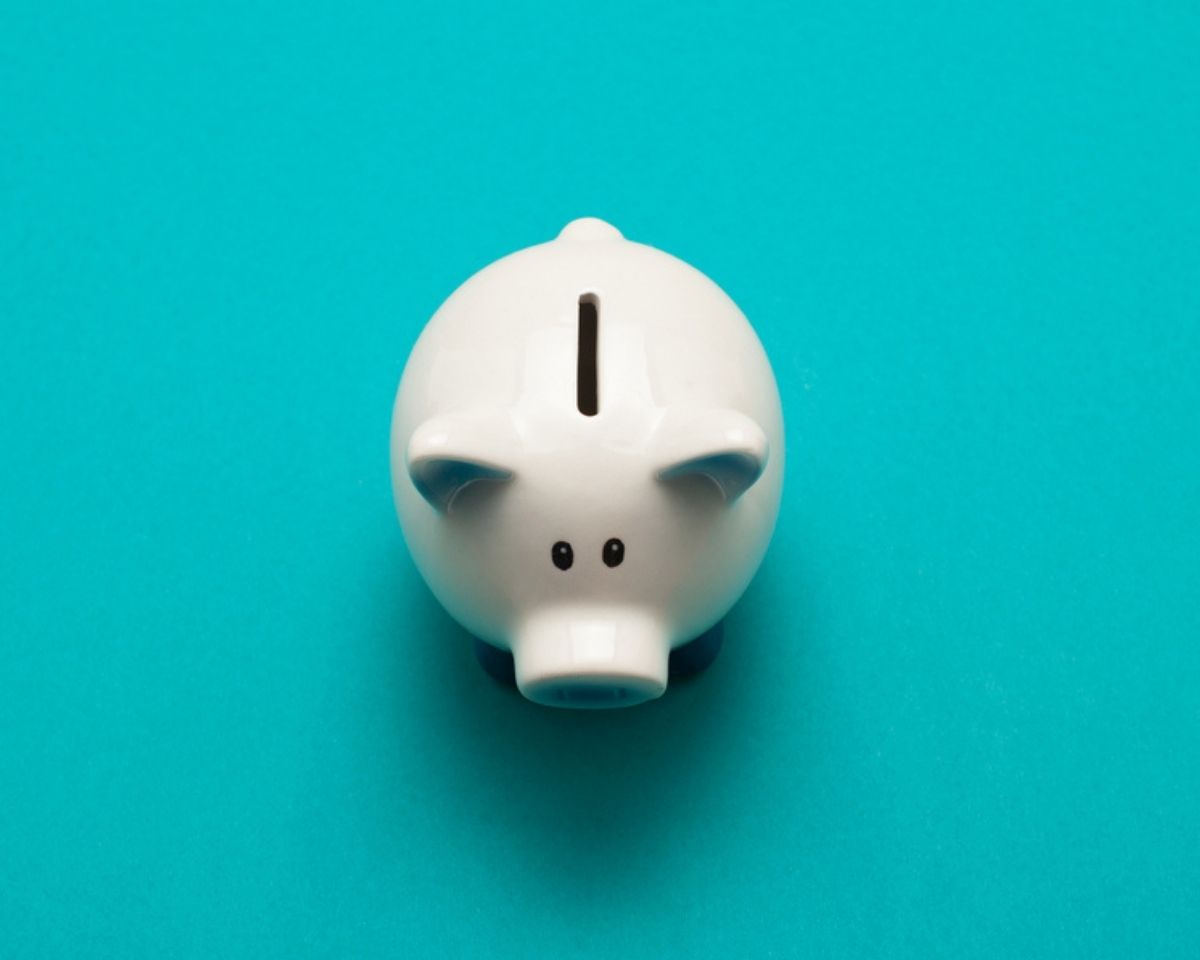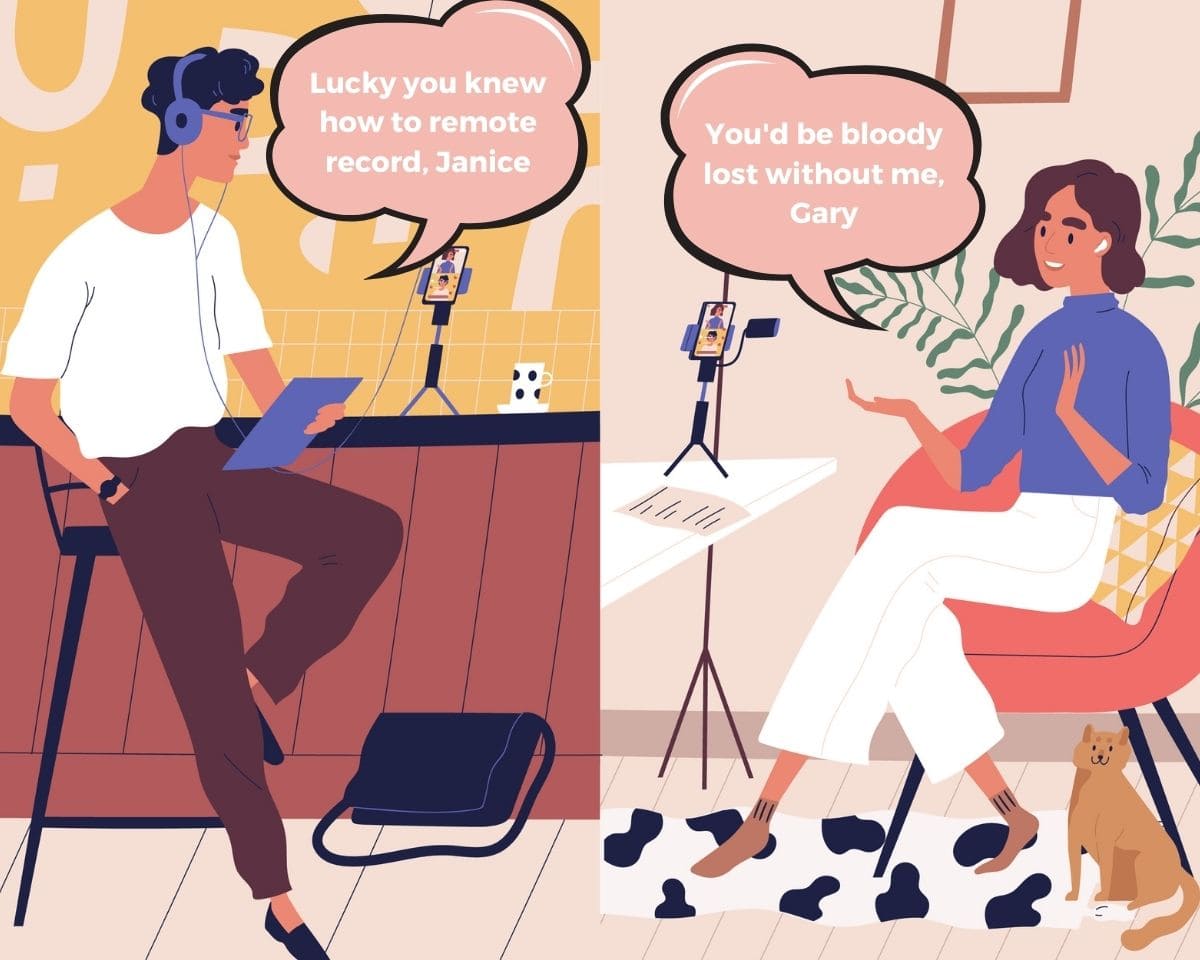Break your show up into bite-sized pieces
If you’re new to podcasting you might be worried that once you start you’ll be stuck churning out episodes every week for the rest of your life.
And while consistency is key, breaking your show into seasons can be a great way to take some of the pressure off so you can make sure you’re delivering episodes on time and sounding their best.
Want help starting your podcast? Download my FREE ‘How To Start A Podcast’ guide.
What are podcast seasons?
Just like in television, seasons in podcasting are a way to separate your content into smaller self-contained batches that you release over time.
How you approach the content of each season is entirely up to you, as long as it all makes sense under the umbrella concept of your show.
Each season could focus on a different story or topic so you’re starting fresh with each batch of episodes.
Or you might have the same style of content across every episode e.g. an interview series, but you release your show in batches with a break in between.
How do podcast seasons work?
Instead of uploading an episode every week for the rest of your life, you might release a season of five, 10, or 20 episodes.
The number is entirely up to you but you want to pick a number that makes sense for your content.
There’s also no hard and fast rule about how long you can have off in between, which means you can make decisions based on what’s best for your life and your content.
Just make sure you give your audience as much information as possible so they know when a new episode doesn’t turn up in their feed, you haven’t disappeared entirely, you’re just on a break.
Do you have to keep making new seasons?
If your podcast wraps up perfectly in one season it doesn’t have to come back again.
In fact, if your content is evergreen, you can keep promoting it on social media and driving new listeners even when you’re not releasing new episodes.
One of my favourite podcasts of all time, S Town, was a single season of content told over seven episodes.
The story unfolded perfectly over those episodes so there wasn’t a need for more and that show has been consistently getting listens for years after the last episode dropped.
While this is definitely something you can think about doing, when you’re starting a show from scratch, it can be a difficult strategy if you want to build an audience because it takes a while for people to find a new show.
Dropping episodes consistently over a longer period of time is a much better approach if you don’t have a huge marketing machine behind you or an existing audience (S Town was made by the people who produced Serial so they had an audience and the cred to get it noticed even with a small number of episodes).
Having said that, if your show content is best suited to a finite number of episodes that’s fine and it can free you up to move on to your next idea.
If, however, your show is suited to more than one season then how many episodes you drop each season is entirely up to you.
Remember that building an audience takes time so it’s best to be regularly releasing episodes but it’s also your show and your life so you know what you’re able to commit to.
What are the benefits of podcasting in seasons?
It makes your podcast more manageable
Releasing episodes in blocks means you can batch record ahead of time which helps you stay on top of your release schedule.
This is especially helpful if you’re recording video, which adds an extra layer of complexity to your podcasting process.
Seasons also give you a chance to take a break between blocks so you’re not crawling over the finish line at the end of every year ready for a nervous breakdown.
It keeps your show interesting
If you release an episode every week in perpetuity you’ll rarely get a chance to make changes or improvements because you’re too busy trying to get a new show out every week.
Releasing your podcast in seasons means you’ll have time in between to look at what needs changing and make improvements.
During this time you could survey your audience to find out what they liked or just change up some of the things that didn’t work for you.
Think of it as a creative reset that helps your next season come back even stronger.
It helps you plan your show content
Doing a show on the fly each week doesn’t give you much ability to think strategically about what each episode is about and how you should plan out your content ahead of time.
If you break your show into seasons you can look at what’s coming up and plan out your episodes according to what’s best for the show and your audience.
The great thing about seasons is they give you the flexibility to think more creatively and keep things interesting for your listeners and more manageable for you.
What are the disadvantages of podcasting in seasons?
It can have a negative impact on your audience growth
If audience growth is your main driver the best way to do that is by releasing episodes consistently over a long period of time.
If you podcast in seasons you will always see a drop off in downloads when you’re not releasing new episodes and it’ll often take you longer to get your podcast back to where it was when you start releasing fresh content again.
If you’re an independent creator, with no obligations to deliver a certain number of downloads for an advertiser the impact of this is just on your ego.
But if you do want to soften audience drop-off during breaks you can release best-of episodes or a series of shorter episodes so there’s something in your feed.
This will help keep your audience engaged and remind them you haven’t disappeared.
Your appetite to do this will depends on how important numbers are to you (remember, no one sees those numbers except you).
But if releasing your show in seasons is the difference between getting your show out and not doing it at all I think it’s worth it even if it means it might impact your ability to grow your audience.
🎙️ Want to start a podcast but feeling overwhelmed?
Grab my free “How To Start A Podcast” guide or get step-by-step support inside my online course, PodSchool.
Got a question about podcasting? Send it my way so I can answer it on the podcast!
Hello. Welcome to the show.
Today I'm answering a question from Angie who asks, is there any problem with releasing your show in seasons, like 10 episodes and a couple of weeks off and then another 10 episodes? And is pre recording getting ahead of yourself for when life gets in the way a good idea? First off, yes, it's a very good idea.
If you can batch record that will help you immensely. It is one of the best ways to keep your podcast on long term.
So if that is possible with the content that you have, I would highly recommend setting aside a recording day or recording half day or whatever you can manage.
Even if it's okay, every hour in this week, every four weeks before my kid gets up, I'm gonna record the, you know, as many episodes of the show as I can get going. That can really help you in the future.
So yes, batch recording is a great way to stay ahead of your There is absolutely no problem with releasing your show in seasons as long as you have the success measures that match up with that.
So one of the things that you need to know if you're going to release your show in seasons is that the best way to grow audience is to release a show every single week or more frequently than that. Although if it's more frequent than that, it better be your full time job consistently over time. You don't want that feed to ever go quiet.
Now that is, if your number one goal is I want my audience to grow to the maximum potential that it possibly can. If your goal is I just want this show out there, I know it's going to create great content for people.
I just want an additional audio resource on my website.
I just want something there that I can consistently point people to that will bring people in in whatever fashion they come in, dribs and drabs or whatever, then seasons can be fantastic. There is no reason that you can't have a really successful show in seasons.
And I would argue that if it is the difference between your show not existing at all because you can't manage a weekly forever schedule, and your show being out there and finding an audience, well, that is success.
So seasons are a great way to make sure that you can get your content up and happening, but that you can also meet that weekly schedule and consistently deliver episodes. So there's no hard and fast rule around seasons. I've had some People do like seasons that are 40 episodes.
So it's like, well, actually, you're kind of always on and then they'll come back for season two and it's like, no, you just came back for your next year and had a break in between. So, you know, I feel like seasons are small, smaller than that. You know, for me, a season is 10 episodes or 12 episodes or 16 episodes.
That feels like more of a season to me. But seasons can be anything that you want them to be. If your show was on for 42 weeks a year and you took a break, you're an always on show.
And I would encourage you over that time to maybe try and use that break time to have some best ofs or even do some, you know, batch records, some short run holiday content so that your feed's never sort of dead entirely. But yes, seasons are the idea of breaking up your show into bits, essentially, and then taking a break in between again. That break can be cold.
You can go completely quiet and there's nothing in the feed. And a lot of people do that because ultimately they're working really hard to get 10 episodes recorded.
And then they're like, right, I've got that 10 episodes recorded. Now I need to work on getting the next 10. So it's not like they can get 14 or, or 20 together to cover the break as well.
So it's totally fine if your show goes quiet in between.
You just need to know that when your show goes quiet in between, your audience will definitely drop off and then they don't come immediately on day one, when season two starts up again, you have to kind of build them not from scratch again. You're not building from zero again. But you know, you have to sort of build that momentum again.
And then people start to check in and go, oh, the show's back, all right, I'm going to see it. So as long as you're aware of that and you know that, then seasons can be a great way to release your show over the long term.
You also don't have to make seasons forever. There are some wonderful shows that have existed as one single season.
So if you have an idea and you want to get it out there and you're like, I don't know that I can make this last forever. Don't just make it as a perfect season. Promote that.
I've listened to so many great podcast seasons and I'm like, I wish that was still going, but not this actual show. I just wish that there were more episodes of this particular season.
But I don't necessarily want that to come back as an ongoing show where they're just going, hey, we've got a lot of listeners here. Let's just try and do a show that kind of fits into this mold because we've got heaps of audience, audience here.
I've seen some podcasters do that, and it just annoys an audience because they want to come for what they come for.
And then if all of a sudden they're getting this new show that's kind of related to the one that they listen to, but really it's just a play by the creators to make the most of the feed that was a little bit more popular than they anticipated it would be. And who wants to start a new feed from scratch when you've got 50,000 people over here listening?
I get it, but it just doesn't work well for an audience. So you can just create a show that exists and is one season and that's fine, or you can do it ongoing.
Some of the benefits, as I mentioned, of podcasting in seasons, it makes your PODC way more manageable. If you are trying to block time out and record, especially if you're doing video, my goodness, does it add some complexity to the process.
So you want to block out some good time. There is nothing better than having a big bank of content in the can because you can work on that any old time.
You know, you can work on that in the hours after your kids asleep, you know, in your lunch break, whatever you need to do, you can use that time to tap away at the edit. You can send that edit off to be helped, worked on by somebody else, which can be really great to help you out in terms of timing.
So we can just make things much more manageable because you can fit into your life, the editing and the show notes and all of that kind of stuff much easier than you can fit sitting down in front of a camera or in front of a microphone, putting makeup on, putting the lights on and getting it all recorded. That stuff needs space in a day, whereas the other stuff, you can kind of chip away at it out in outside hours. It also keeps your show interesting.
So one of the great things about podcasting in seasons is that it gives you a bit of space and time to think, how can I improve the next season?
When you are doing an always on show, you're kind of just on the hamster wheel now, Naturally you need to be thinking about your content, you need to be planning, you need to be thinking about your audience. What is best for them, but it's also like a bit of a grind when you're kind of getting through things week by week.
Whereas when you're doing seasons, you can look at it and go, okay, great, I'm going to do 20 episodes. What's the plan of that content? Then you can do that and then take that time to go, what worked about that? What didn't work about that?
You could also take time to survey your audience in the break and say, hey, what did you enjoy about season one? So that I can bring that into season two.
So it can sometimes give you a bit of that space and breath that you often don't get when you are doing an always on show. Because the goal there is to just keep the content churning all the time so there can be a lot of opportunity to improve in between seasons.
It can also help you plan your show content. So again, you should definitely be planning out your week by week show content.
But if you're doing things in seasons, you've got a little template there that you can look at and go, right, what's the best spread of these 10 episodes? Like, where should I place them? What's the best kind of way to tell this story for an audience? And then what can I do?
So you can sort of have more of a bird's eye view because you know this is only going to exist in the package that it's going to exist in. So then you can make some really cool decisions around how that content rolls out that you might not have time or space to do.
If you are doing an always on show.
Some of disadvantages is, as I mentioned, it can have a negative impact on your audience growth, but that's only if your top priority goal is just growing this show as high as it can be.
If you understand that and then you work to keep promoting the show during the breaks, if you can put a bit of content in during those breaks just to keep the feed alive.
If you know you've got to really pump up the launch when you launch season two so that you get people in as quickly as you can, then you can manage it. It's just that that releasing shows consistently over time is the best thing for audience growth.
But as I said, if this is the difference between you doing this show and you not doing this show, then I truly think that seasons can be a fantastic way to get your show out there in a manageable way that you can get on top of that. Feels like you are controlling your podcast rather than your podcast controlling you. So thank you so much for the question.
Angie, if you want to submit a question, the link is in the description of the episode, as is the link to my online podcasting course, Pod School, as well as my free podcasting guide that you can download that shares all of the tools and tech that you need to get your show up and happening. So if you have a question, I would love to answer it on this show.
If you know anybody who is, you know, starting a podcast or wants to do a podcast or is interested about podcasting, please share this show with them. I would love to help them out and I will see you next week. Oh, and if you're in an app that allows you to leave a review, like, why not?
So, yeah, that's all for today.










